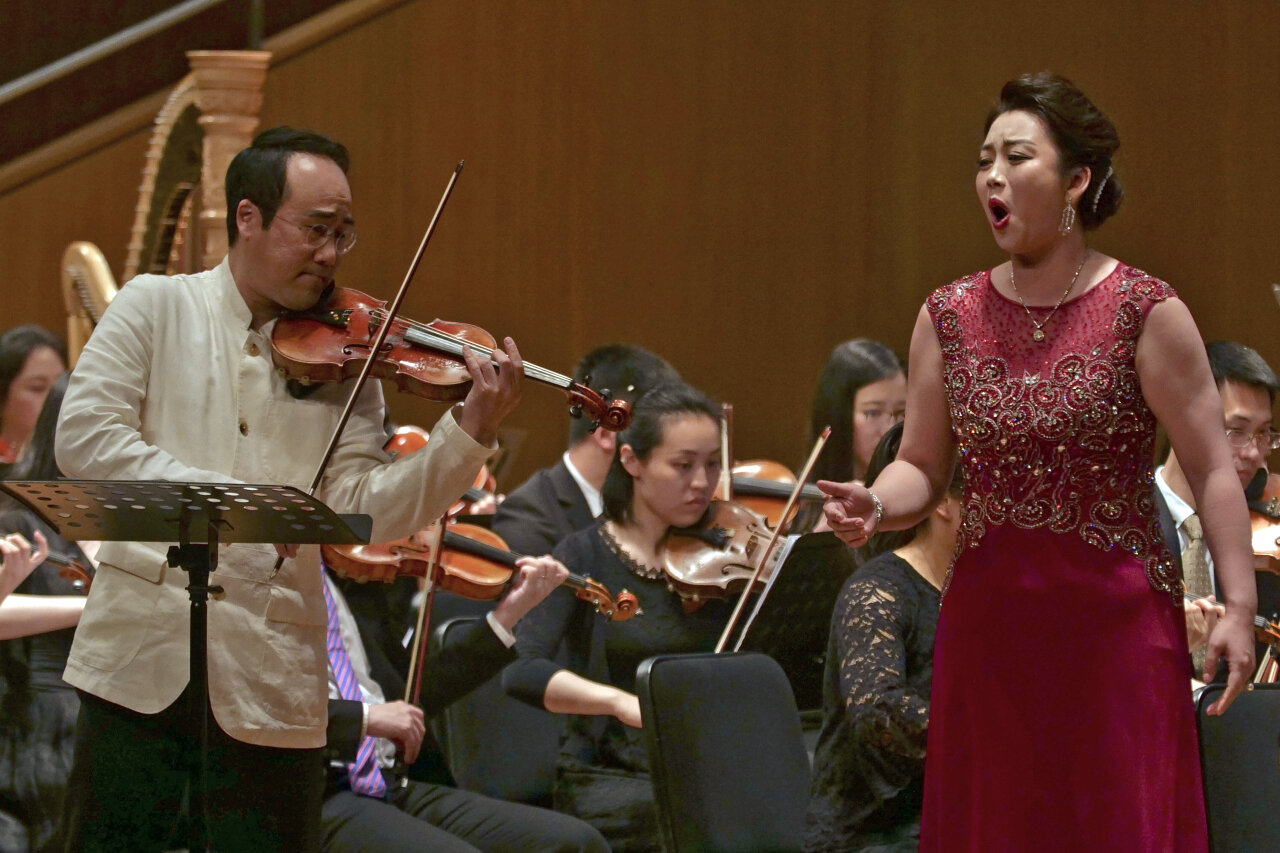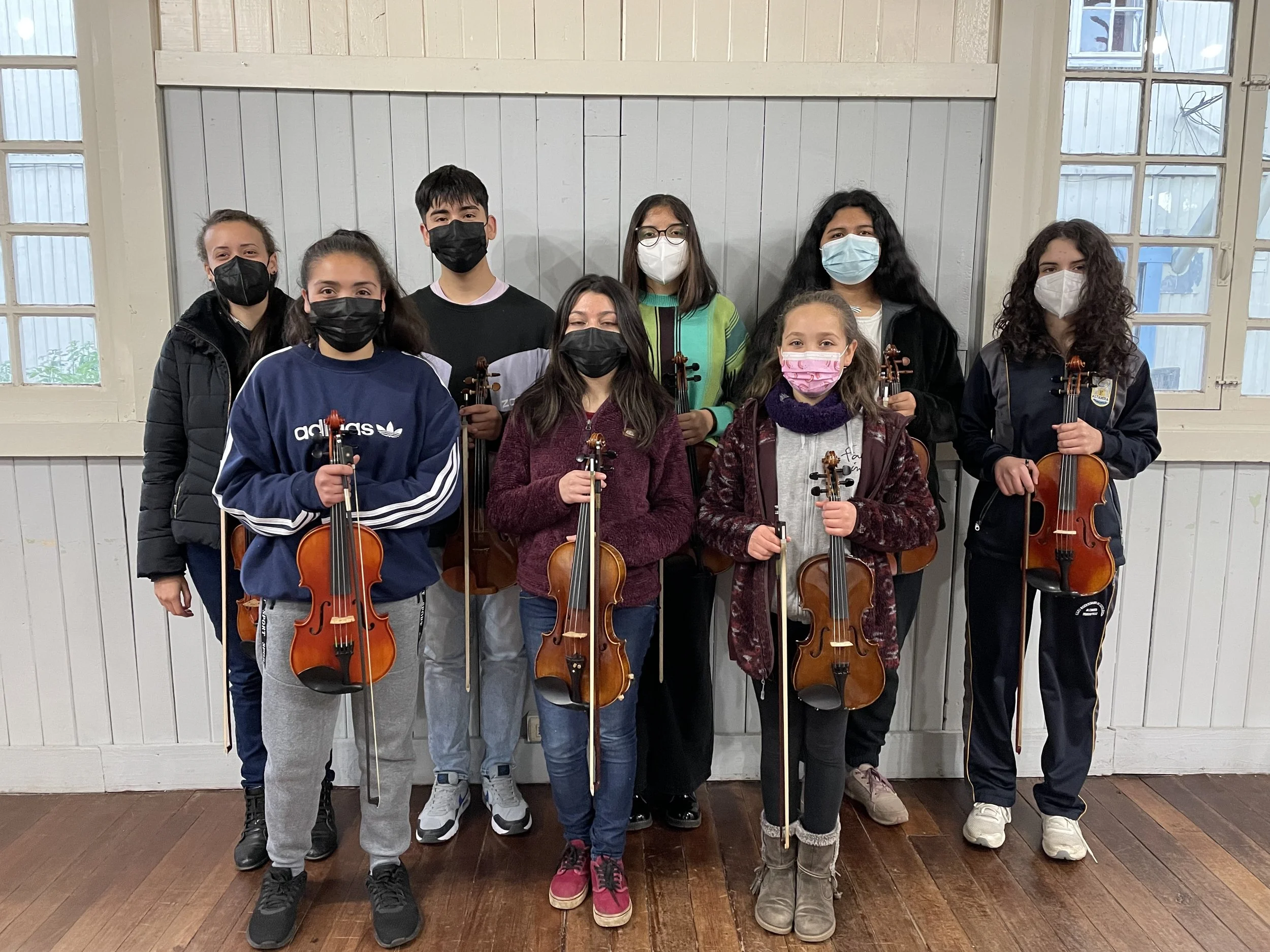Peace through Music
Origin of Lindenbaum
In 1999, Jewish conductor Daniel Barenboim and an English scholar from Palestine founded the ‘Divan Orchestra.’ This orchestra includes teenagers from countries in the Middle East such as Israel and Palestine, where the relationship is intense, as well as Syria and Iran. They practice their music in Spain and perform around the world. The name of this orchestra was derived from the book named ‘Divan,’ which Goethe wrote after being impressed by the translation of the poem by Persian poet Hafiz. In 2011, they performed Beethoven’s Symphony No. 9 ‘Choral’ at Imjingak in Paju, South Korea. At the Palestine Ramallah concert in 2005, Barenboim, the founder of the orchestra, said: “Music cannot be a tool to accomplish a certain goal, like orchestra cannot bring real peace to the Middle East. However, since music functions as one of the languages, it can affect people’s minds and emotions, integrate them, set the stage that creates a good mood and be the basis of a certain goal.”
1989 Beethoven Symphony No. 9 ‘Choral’ Conducted by Leonard Bernstein
On Christmas Day in 1989, when the Berlin Wall collapsed, Leonard Bernstein, the conductor of the New York Philharmonic Orchestra, conducted Beethoven’s Symphony No. 9 ‘Choral’, first piece of music to be named part of UNESCO world heritage and part of a UN Memory of the World, at Sarsfield House in East Berlin.This performance involved the combined efforts of two orchestras:one composed of musicians from the four countries occupying Berlin, and the other, known as the Staatskapelle Dresden, made up of East and West Germans. The chorus part from the 4th Movement of Beethoven’s Symphony No. 9 is a combination of the melody by Beethoven and the poem by Schiller. “Freude, schöner Götterfunken, Tochter aus Elysium, Wir betreten feuertrunken, Himmlische, dein Heiligtum! Deine Zauber binden wieder Was die Mode streng geteilt; Alle Menschen werden Brüder Wo dein sanfter Flügel weilt…” The performance conducted by Bernstein on that day was broadcast live worldwide. To this day, it represents one of the most moving performances in praise of humanity and peace beyond German reunification. Leonard Bernstein dreamed of the end of the Cold War through music and founded the Pacific Music Festival in Sapporo, Japan, in 1990. Sapporo, the city of snow, holds a global music festival each summer. After passing an audition, musicians from twenty-seven different countries around the world can participate in the performances.
Leonard Bernstein conducts Beethoven's 9th symphony at the Berlin Celebration Concert in commemoration for the German reunification (1989).
Korean Peninsula Peace Orchestra Project
Inspired by Bernstein's passion and philosophy and Barenboim's Divan Orchestra, the 'Lindenbaum Festival' was founded in South Korea in 2009. As our first conductor, we invited Charles Dutoit, chief conductor of the Philadelphia Orchestra and music director of the Royal Philharmonic. This was the beginning of a Korean-style peace festival that consists of globally famous orchestra principals and talented young Koreans. The purpose of the Lindenbaum Festival is to create an orchestra formed of South and North Korean young musicians to show that North and South Korea can work together to communicate through music, just as trees gather to form a forest.
When we were about to start peaceful exchanges through music with North Korea, tensions on the Korean Peninsula rose due to the death of a South Korean tourist at Mount Geumgang in North Korea. Since then, although there have been some difficult political situations, we have looked for various ways of harmonizing through music. We sent our proposal to the Swiss and Belgian Ambassadors to Seoul (whose offices are in Pyongyan, the capital of North Korea), met well-established civic organizations in this field, and made continuous efforts to engage the public through media. As a result, we received an invitation to Pyongyan from the Chosun Arts Exchange Association under the North Korean Ministry of Culture in June 2011. Still, because of the 5.24 Act (the South Korean government’s sanctions against North Korea on May 24th, 2010, due to the sinking of the ROKS Cheonan) and negative public opinions towards North Korea, only a Swiss conductor, Charles Dutoit, could enter North Korea. Dutoit has received a positive response from the North Korean Ministry of Culture and the executives of the Chosun Arts Exchange Association in regard to the joint performance of an orchestra formed of South and North Korean young musicians at Pyongyan and Seoul (capital of South Korea) in October, 2011.
At that time, the Ministry of Unification in South Korea acknowledged our efforts for pure, non-political cultural exchange between North and South Korea, which allowed us to contact the North Koreans. (This needs official permission from the government.) Since then, through the counselor who was in charge of the office of UN North Korea Mission, as well as the Blue House and the Ministry of Unification, we delivered our proposal for a joint orchestra formed of South and North Koreans in Germany of 2014, marking the 25th anniversary of German reunification. After reading our proposal, Germany’s world-renowned ‘Rurh Piano Festival’ sent us an invitation; thus, with support from Frank-Walter Steinmeiere (the minister of foreign affairs in Germany at that time), our idea for a joint orchestra formed of South and North Koreans became one of the items on the agenda for the South Korea-Germany summit held in March of 2014. Sadly, however, it did not happen.
In 2015, to celebrate the 70th anniversary of Korea’s liberation from Japanese colonial rule, we planned to perform Beethoven’s ‘Choral’ Symphony No. 9 at the border, JSA (the Joint Security Area) in Panmunjom (also called ‘Truce Village’: the location where the armistice between North and South Korea signed in 1953), with North Korean Choirs and a South Korean orchestra situated in front of the border between South and North Korea. This plan involved North Korean choirs performing on Mount Baekdu and a South Korean orchestra performing at Independence Gate in Seoul on August 13th, before both met in Panmunjom. However, on August 15th, the bus that was carrying the South Korean orchestra members was unable to cross the Unification Bridge; this was the only way to get to Panmunjom. This was due to the explosion of a wooden-box mine in the demilitarized zone (DMZ) on the Korean peninsula, which resulted in the serious injury of a South Korean soldier. To allay the performers’ disappointment due to the cancellation of the performance in Panmunjom, they performed the same piece at the Seokjang-ri Art Museum, while the North Korean choir held a solo event in Panmunjom.
DMZ Lindenbaum Festival
Although North Korea was unable to participate, the Lindenbaum Festival has held an annual peace concert every August at Camp Greaves in the DMZ. The Lindenbaum Festival performed at the opening ceremony of the 2016 DMZ International Documentary Film Festival, had a joint concert with the Harvard Radcliffe Orchestra in 2017 and the Yale Symphony Orchestra in 2018, and invited the National Children’s Choir to the DMZ to perform music together in 2019. These events show the numerous possibilities for this organization and lend support to the idea of holding a performance for an orchestra formed of South and North Koreans in the DMZ. Camp Greaves is the nearest place to the frontline where ordinary South Koreans could visit and perform. It is only 2km away from the border line and is also known as the station where the 506th Regiment of the U.S. 2nd Infantry Division stayed for about 50 years. We used a bowling alley and a gym in this camp as the performance hall; the performers and audience needed to obtain approval to enter the Unification Bridge checkpoint, which allows people to enter near the frontline and was under the control of the 1st division of the South Korean Army. In 2017, when some Harvard students participated in the Lindenbaum Festival, their parents in the U.S. were considerably worried due to President Trump's "Fire and Fury" rhetoric towards North Korea. This had raised tension between South and North Korea. However, in an interview with CNN, those same Harvard students reassured their parents that they had reached the DMZ, which was safe. It was an impressive moment.
Lindenbaum Festival Orchestra performs at Camp Greaves in 2017. The orchestra has been holding concerts at the site proximate to the DMZ since its foundation in 2009.
On the other hand, we have given lectures on the topic of "Music Diplomacy on the Korean Peninsula" at the invitation of Harvard, Princeton, and Columbia Universities. In these talks, Mr. Won informed listeners of the unfortunate reality on the Korean Peninsula –namely, that non-political musical performances (or musical communication), without any other political intentions, could not be held although there was approval from the South and North Korean governments. Mr. Won also discussed how communication through music is the first step towards peace. Drawing upon these aforementioned experiences, as well as his strong desire for Music Diplomacy on the Korean Peninsula, Mr. Won also delivered our message to Oxford, SOAS University of London, Sciences Po (Paris Institute of Political Studies), Sorbonne University, IHEID, Yale, Syracuse, Georgetown, and George Washington University. Invited to the UN Geneva Peace Talks on the 2017 UN International Day of Peace, Hyung Joon Won gave a speech with former UN Secretary-General Kofi Annan about the topic of "Music Diplomacy on the Korean Peninsula." Moreover, at the invitation of the International Olympic Committee (IOC), he gave a musical performance to Thomas Bach, the IOC President, and other IOC members at the Lausanne Olympic Museum in Switzerland. It was at this event that he explained his dream of the two Koreas meeting at the 2018 PyeongChang Winter Olympics, where they could come together through music and sports.
Another chance after 10 Years
2019 South & North Korea Joint Performance in Shanghai (Left – Hyung Joon Won, Right – Song-Mi Kim)
On May 12th of 2019, North Korean soprano Song-Mi Kim and South Korean violinist Hyung Joon Won held a South and North Korean joint performance with the Shanghai City Symphony Orchestra at the Oriental Art Center in Shanghai, China. Performing Dvorak’s ‘Songs My Mother Taught Me’ together in front of about 3,000 Chinese audience members, they showed the possibility of the two Koreas becoming one through music. This performance was broadcast live worldwide by the Associated Press. On September 22nd of the same year, this duo performed Arirang and an arrangement by Dvorak at the Musikaliska Theater in Stockholm, Sweden, with the theme of ‘The Unlimited Power of Music.’ Numerous Koreans overseas as well as Swedish diplomats gave their support and cheered at this concert. It was a historic moment for North Korean soprano Song-Mi Kim to have a joint performance with a South Korean, which she accomplished by visiting Europe with her first travel visa. Not only was the event of the two Koreas’ performing music together both impressive and touching, but the process itself, which enabled them to experience harmony and peace, is significant. Although there has not been much progress yet, we believe that peace through music between the two Koreas will gradually expand. Without these artistic and musical communications, the big picture of peace and reunification on the Korean Peninsula would be nothing but imagination.
Hyung Joon Won
Artistic Director, Lindenbaum Festival








